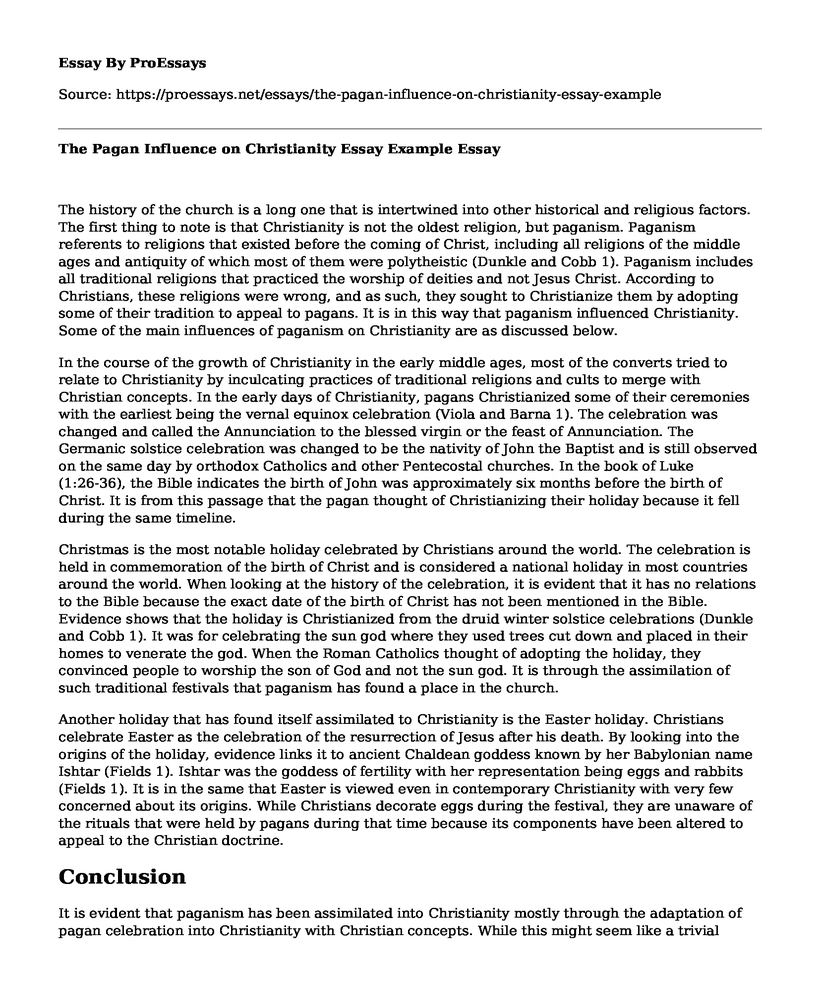The history of the church is a long one that is intertwined into other historical and religious factors. The first thing to note is that Christianity is not the oldest religion, but paganism. Paganism referents to religions that existed before the coming of Christ, including all religions of the middle ages and antiquity of which most of them were polytheistic (Dunkle and Cobb 1). Paganism includes all traditional religions that practiced the worship of deities and not Jesus Christ. According to Christians, these religions were wrong, and as such, they sought to Christianize them by adopting some of their tradition to appeal to pagans. It is in this way that paganism influenced Christianity. Some of the main influences of paganism on Christianity are as discussed below.
In the course of the growth of Christianity in the early middle ages, most of the converts tried to relate to Christianity by inculcating practices of traditional religions and cults to merge with Christian concepts. In the early days of Christianity, pagans Christianized some of their ceremonies with the earliest being the vernal equinox celebration (Viola and Barna 1). The celebration was changed and called the Annunciation to the blessed virgin or the feast of Annunciation. The Germanic solstice celebration was changed to be the nativity of John the Baptist and is still observed on the same day by orthodox Catholics and other Pentecostal churches. In the book of Luke (1:26-36), the Bible indicates the birth of John was approximately six months before the birth of Christ. It is from this passage that the pagan thought of Christianizing their holiday because it fell during the same timeline.
Christmas is the most notable holiday celebrated by Christians around the world. The celebration is held in commemoration of the birth of Christ and is considered a national holiday in most countries around the world. When looking at the history of the celebration, it is evident that it has no relations to the Bible because the exact date of the birth of Christ has not been mentioned in the Bible. Evidence shows that the holiday is Christianized from the druid winter solstice celebrations (Dunkle and Cobb 1). It was for celebrating the sun god where they used trees cut down and placed in their homes to venerate the god. When the Roman Catholics thought of adopting the holiday, they convinced people to worship the son of God and not the sun god. It is through the assimilation of such traditional festivals that paganism has found a place in the church.
Another holiday that has found itself assimilated to Christianity is the Easter holiday. Christians celebrate Easter as the celebration of the resurrection of Jesus after his death. By looking into the origins of the holiday, evidence links it to ancient Chaldean goddess known by her Babylonian name Ishtar (Fields 1). Ishtar was the goddess of fertility with her representation being eggs and rabbits (Fields 1). It is in the same that Easter is viewed even in contemporary Christianity with very few concerned about its origins. While Christians decorate eggs during the festival, they are unaware of the rituals that were held by pagans during that time because its components have been altered to appeal to the Christian doctrine.
Conclusion
It is evident that paganism has been assimilated into Christianity mostly through the adaptation of pagan celebration into Christianity with Christian concepts. While this might seem like a trivial addition to Christianity, it affects the true nature of worship and is misleading to the unknowing who have not interacted with the Bible.
Works Cited
Dunkle, Frank, and David Cobb. Paganism in Christianity. (2011). P1
Fields, Kitty. Christianity's Pagan Roots: Traditions, Practices, and Holidays. (2017). P1
New International Version. Biblica, 2011. BibleGateway.com, www.biblegateway.com/versions/New-International-Version-NIV-Bible/#booklist.
Viola, Frank, and George Barna. Pagan Christianity? Exploring the roots of our church practices. Tyndale House Publishers, Inc., 2010.
Cite this page
The Pagan Influence on Christianity Essay Example. (2022, Nov 20). Retrieved from https://proessays.net/essays/the-pagan-influence-on-christianity-essay-example
If you are the original author of this essay and no longer wish to have it published on the ProEssays website, please click below to request its removal:
- Full Content Sermon Outline - Course Work Example
- Response to McCloskey's on Being an Atheist Essay
- Principal Beliefs in Judaism Essay
- Divine Filiation: New vs. Old Covenant Essay Example
- Is Buddhism a Religion or a Philosophy?
- Essay Sample on Christian Hymnody: Expressing Worship & Praise to God
- Essay Example on ISIS: Rising to Power & Impact on Islamic Religion







